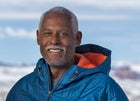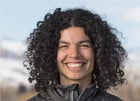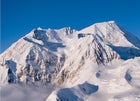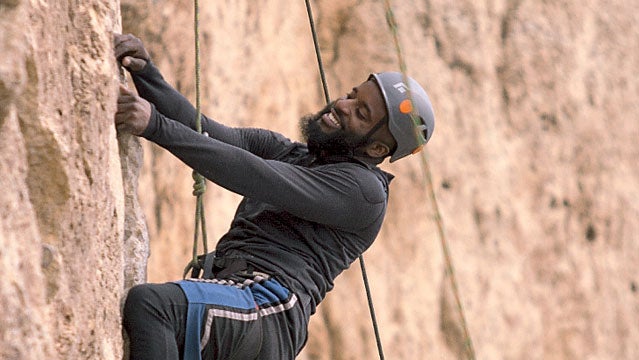This spring marks two big anniversaries in the mountaineering world: 50 years since the first American team climbed Mount Everest, and 100 years since the first summit of Alaska’s Mount McKinley. As you’d expect, there are the usual commemorative expeditions hitting the ridgelines, among them Denali 2013, which aims to put five bloodline descendants of the mountain’s first climbers atop the 20,320-foot peak. But the one that could have the greatest impact will be looking forward, not back. This June, , a collection of 12 teachers, wilderness instructors, and students, hopes to become the first African-American team to summit North America’s highest mountain. Their larger goal: to draw attention to the persistent lack of diversity in the outdoors—and to give rise to a new generation of wilderness advocates.
37
Percentage of African-American kids who got outdoors last year Veteran Mountaineer Stephen Shobe
Veteran Mountaineer Stephen Shobe Former NOLS student Adina Scott
Former NOLS student Adina Scott Step one: Denali
Step one: DenaliEfforts to improve minority participation outside are nothing new, but Expedition Denali’s focus on minting heroes is a first. As team member and veteran climber Stephen Shobe, 51, puts it, “It’s hard to get inspired about the outdoors when the population doesn’t look like you.”
Seventy-eight percent of Americans who participated in outdoor activities last year were white, with African-American kids at the bottom of the demographic heap—just 37 percent between the ages of 6 and 12 went hiking, biking, or fishing. It’s something Expedition Denali’s primary backer, the (NOLS), has been working hard to improve. In 1994, the Lander, Wyoming, nonprofit devised a diversity program that has since doled out more than $1.5 million in scholarships to help get minority youth into its courses, which teach wilderness and leadership skills through extended adventure trips. “We work hard to recruit young people of color, but we still struggle,” says Aparna Rajagopal-Durbin, who manages NOLS’s diversity program. “There are many barriers, including the lack of role models.” That’s where Expedition Denali comes in, and NOLS has budgeted nearly $250,000 for the group’s efforts.
“People are encouraged to participate in the outdoors through mentorship,” says Frank Hugelmeyer, president of the . “Those mentor chains are well established among America’s white population, but less so with minorities.”
For NOLS and other wilderness organizations, this isn’t just altruism; it’s part of a long-term strategy. In the next three decades, demographics experts estimate, people of color will make up the majority of the U.S. population. If NOLS wants to continue to thrive as a source of environmental and business leaders, it needs to attract more nonwhite participants—and staff. Currently, only two of NOLS’s 800 instructors are African-American.
Whether they summit or not, the members of Expedition Denali plan to embark on two-week speaking tours of historically black colleges, churches, and public schools. Team members will also lead kids on hiking, backpacking, and bouldering adventures, from California’s Sierras to Washington’s Cascade Mountains.
It’s easy to be skeptical about how much impact a climb like this can achieve, but Shobe insists that topping out on Denali is just the first step. “If the only suggestion of how to get more diversity outdoors is to summit a mountain, then I’d agree: What is one climb really going to do?” he says. “But our goal is more far reaching. Nothing like this is ever accomplished in a day.”


